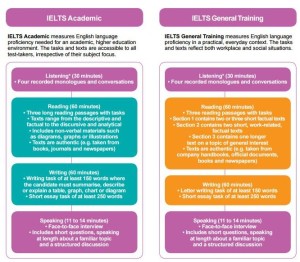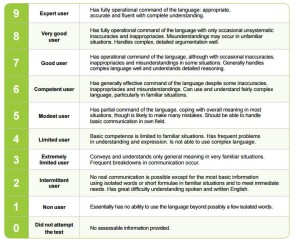The International English Language Testing System (IELTS) assesses the English language proficiency of people who want to study or work in English-speaking environments. It provides a fair, accurate and relevant assessment of language skills, based on well-established standards, and covers the full range of proficiency levels, from nonuser to expert user. There are two main versions of IELTS. Test takers can choose either Academic or General Training versions of the test. Both versions of the test consist of four separate components, assessing the four language skills – Listening, Reading, Writing and Speaking.
The difference between the two versions of the test is that the Reading and Writing components of IELTS Academic have subject matter and tasks suitable for the test takers entering undergraduate or post graduate studies. The Listening and Speaking components are the same.
Key similarities
• The Listening and Speaking components are the same for both versions. The distinction between ‘academic’ and ‘general’ literacy has traditionally been seen as most marked in relation to reading and writing skills. The more socially-oriented language skills of listening and speaking are equally important in an academic study or professional context
• The same amount of time is allocated to complete the Listening and Speaking components in both the General Training and Academic Versions
• The Reading and Writing components are the same length in both versions
• Both versions have the same minimum word requirement
• The same assessment criteria and 9-band scale is used to grade both versions.
Differences
The Reading component of the Academic and General Training versions is differentiated in terms of:
• the choice of texts (topic, genre, length, number, etc)
• the level of difficulty of the 40 test items. The Academic Reading component has more items pitched at bands 5-8, whereas the General Training has more items pitched at bands 3-6. This is a reflection of the different demands of Academic and General Training.
For Writing, the Academic and General Training versions are differentiated in terms of:
• the content and nature of the two writing tasks
• the contextual parameters of the tasks.
However, given the level of differentiation described above, this does not mean that the scores across Academic and General Training Reading or Writing components are interchangeable.
There is no pass or fail in IELTS. Each band corresponds to a level of competence in English. All parts of the test and the overall band score are reported in whole or half bands, e.g. 7.0, 8.5. Test takers receive an overall band score as well as individual scores for each test component (Listening, Reading, Writing and Speaking).
Who accepts IELTS (International English Language Testing System)?
Here are just a few of the leading organisations that will accept your certificate:
Philips
Harvard Business School
University of Cambridge
International Monetary Fund
University of Western Australia
Commission on Graduates of Foreign Nursing Schools
StudyPortals


